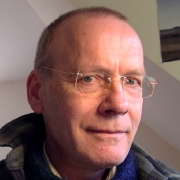Herbert Jaeger, renowned expert on reservoir computing, starts in Groningen as professor in Computation in Cognitive Materials
At CogniGron, we are delighted to welcome Herbert Jaeger, who will join our team as Professor of Computing in Cognitive Materials.

Herbert Jaeger is internationally recognized for pioneering the field of "reservoir computing" (RC). In this non-standard approach to computer chip design, computing can be non-digital and does not necessarily use transistors as basic computing elements. Instead, a randomly structured lump of nonlinear material (possibly nano-scale) is used as a "reservoir" of dynamical phenomena. The input data are fed into this material reservoir and "excite" high-dimensional response dynamics within it, from which the desired output is distilled with machine learning methods. This can be done not only with electrical forms of input signals, but also with optical, chemical, mechanical, magnetic, or mixtures thereof. Due to this universality, and also because RC has some fascinating similarities with how biological brains work, reservoir computing has become an important approach to make computing more "cognitive" and also more energy-efficient than it is possible with standard digital hardware. Exploring nonlinear effects of novel materials for use in non-standard computing technologies is a core mission of CogniGron.
Future Work
Herbert’s research has always been revolving around questions concerning the modeling of “cognitive“ information processing systems. This quest had pulled him on a meandering path through classical AI, robotics, signal processing, computational neuroscience, machine learning and neuromorphic computing. In all of these fields he tried to find mathematically beautiful descriptions and efficient modeling/learning algorithms. For his future work at CogniGron, he wants to help working out mathematical/algorithmical bridges between the CogniGron pillar disciplines: AI, machine learning, CS, mathematics, material science, neuroscience. Researchers in these diverse fields speak different mathematical languages, which root in different conceptual frameworks. Building bridges between these fields means to develop new “cross-cultural“ formalisms and models, a wonderful challenge both for the most abstract theoretical/conceptual thinking, as well as for the most concretely useful algorithm design.
Curriculum Vitae
Herbert Jaeger studied mathematics and psychology at the University of Freiburg and obtained his PhD in Computer Science (Artificial Intelligence) at the University of Bielefeld in 1994. After a 5-year postdoctoral fellowship at the German National Research Center for Computer Science (Sankt Augustin, Germany) he headed the "Intelligent Dynamical Systems" group at the Fraunhofer Institute for Autonomous Intelligent Systems AIS (Sankt Augustin, Germany). In 2003 he was appointed as Associate Professor for Computational Science at Jacobs University Bremen where he has been leading the „Modeling Intelligent Dynamical Systems (MINDS)“ group (http://minds.jacobs-university.de/) until his CogniGron appointment as Professor of Computing in Cognitive Materials on August 1, 2019.
| Last modified: | 27 August 2019 11.56 a.m. |
More news
-
10 June 2024
Swarming around a skyscraper
Every two weeks, UG Makers puts the spotlight on a researcher who has created something tangible, ranging from homemade measuring equipment for academic research to small or larger products that can change our daily lives. That is how UG...
-
21 May 2024
Results of 2024 University elections
The votes have been counted and the results of the University elections are in!
